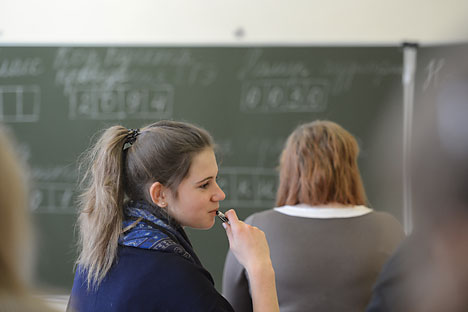
The State General Certificate Exam and the Unified State Exam were introduced in Russia in 2009.Source: Evgeny Biyanov/RIA Novosti
In her suicide note, 16-year-old Anya (name changed) from Volgograd Region thanked her teachers and parents for loving her and bringing her up. “You asked me to be strong but I failed,” she wrote in the note.
Anya hung herself close to her home and was found by her headmistress. According to her friends, family and teachers, Anya was very popular in school and excelled in sports, winning prizes in regional competitions. If she happened to get poor marks, her parents never scolded her. That is why her suicide after having failed in the State General Certificate Exam in mathematics has left everyone in a state of shock.
According to media reports, in the suicide note that she left in her room, Anya also asked for State General Certificate exams (which are taken at the end of secondary school, an equivalent of the Unified State Exams taken when leaving high school two years later) to be cancelled in order “to stop torturing children.”
The Volgograd Region prosecutor’s office has launched a probe to establish what provoked the suicide and the role that the exam had to play in it. Exam-related suicides are very rare in Russia.
The State General Certificate Exam and the Unified State Exam were introduced in Russia in 2009, after various trials over an eight-year period. They replaced the old system that consisted of secondary and high school-leaving exams followed by college and university entrance exams.
No special studies have been conducted to assess how much more stressful the new exams were compared with the previous system, however individual facts and opinions suggest that some pupils and teachers, albeit a minority, do come under significant stress.
School-leaver Lera Sheveleva says she did not find the Unified State Exam too stressful even despite the fact that, as prescribed by the rules, it was held not in her school but on neutral territory.
“I was not at all scared. We gathered outside our school and were then taken to the school where the exam was held,” Sheveleva said. “We handed in our mobile phones (smuggling a mobile phone into the exam room is punishable with disqualification), walked through metal detectors, signed in and were given the name of the room, where we then waited for 20-30 minutes for the exam to start.”
Natalya Fedorova, a homeroom teacher in a school in south Moscow, says that children are most of all stressed by all the security measures associated with exams. CCTV cameras, metal detectors and unfamiliar teachers make children nervous. “In some children, stress may cause a deterioration of a chronic medical conditions or cause high blood pressure,” says Fedorova.
“Another problem is that children go to another school to take the exam, where they are surrounded by teachers whom they do not know,” Fedorova adds. “Those teachers are of course very kind to them because it does not matter to a teacher where children are from, but still pupils cannot help feeling nervous.”
According to Vera Grebneva, a psychologist with School No 5 in the Moscow Region town of Korolev, she noticed “a stream of children who became afraid of the Unified State Exam in 2014, when schools introduced CCTV cameras in exam rooms, after a series of scandals when papers were leaked on the Internet.”
Grebneva says students got another scare this year when there was speculation that the Unified State Exam in English would become compulsory. “Frankly speaking, all this causes extra stress. The worst thing is not the exam itself but misreported information,” she says.
According to Isak Frumin, the head of research at the Institute of Education under the Higher School of Economics in Moscow, the Unified State Exam is more stressful for schoolchildren than the previous system, since the stakes are too high and it can be retaken only once a year.
Grebneva believes that for many children, on the contrary, the Unified State Exam has reduced stress since it combines two sets of exams. “The Unified State Exam presents the biggest challenge to children who, inherently, lack self-confidence and are emotionally unstable. But they would be equally scared of the exams in their old form too.”
According to Grebneva and Fedorova, what matters most is that society, and parents in particular, do not put pressure on schoolchildren, but they instead support them strongly.
The State General Certificate and the Unified State exams have another stressful side that is not spoken of too often. It affects teachers who organize and invigilate exams as well as teachers who prepare their pupils for the Unified State Exam.
“The teacher in charge of an exam must give clear instructions to the school-leavers taking the exam,” Fedorova says. “In addition, after the exam they must arrange the submitted exam papers in the right order.”
The exam is written on a number of papers that are not attached to each other. The exam is checked by a computer. If the papers are in a wrong order, the result will be different. If the teacher makes a mistake, not only will a schoolchild have his or her exam paper rejected, the teacher will also receive an official reprimand and may be stripped of bonus pay.
Teachers in Russia are not entitled to additional pay for organizing the Unified State Exams.
If pupils show poor exam results, this is reflected in their school’s rating, which in turn is taken into account in funding allocation.
All rights reserved by Rossiyskaya Gazeta.
Subscribe
to our newsletter!
Get the week's best stories straight to your inbox